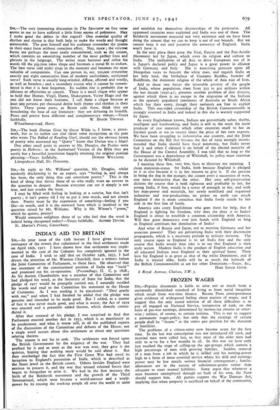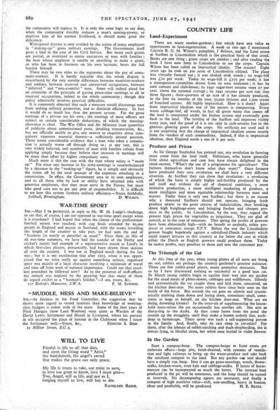FROZEN WAGES
Sin,—Popular discontent is liable to arise not so much from a universally diminished standard of living as from social inequities which result from war-time finance. Recent Press correspondence gives evidence of widespread feeling about matters of wages, and I suggest that the only sound solution of all these difficulties is to pay all engaged on National Service, irrespective of rank, on the basis of pre-war earnings, determined by income-tax returns or other- wise ; subject, of course, to certain minima. This is not to suggest a permanent wages-policy, but only that the earnings of certain people shall be " frozen " at the status quo position for the duration of hostilities.
The problems of a citizen-army now become acute for the first time. In the last war conscription was not introduced till 1916, and married men were called last, so that most of the older men had only to M7Ve for a few months in all. In this war we have only just reached the stage of calling-up the age-groups which contain a high percentage of men with growing families. Sudden removal of a man from a job in which he is skilled and his earning-power high to a form of more essential service where his skill and earning- power may be low entails serious financial consequences ; family- allowances are in the nature of subsistence-grants rather than adequate to meet normal liabilities. Some argue that whenever a man becomes unemployed through no fault of his own, the State should support him. All parties support the War Damage Act, implying that. when property is sacrificed on behalf of the community, the community will replace it. It is only the same logic to say that, when the community forcibly reduces a man's earning-power, or deprives him of his normal livelihood, it should make good the deficiency.
Widespread distress is only avoided by the action of many employers in " making-up " gross military earnings. The Government itself gives a lead in the case of the Civil Service. But many such grants are partial, or restricted to senior executives or men with families ; the man whose employer is unable or unwilling to make a grant, or who has been in business on his own "account, bears the full burden himself.
There may be two sides to the argument about the pay of arma- ment-workers. It is hardly arguable that the whole dispute is exacerbated by the very notable differences between munition-workers and soldiers, between reserved and unreserved occupations, between " deferred " and " non-essential " men. Some will indeed plead for an extension of the principle of paying peace-time earnings to all in reserved occupations, indeed to the whole community ; though this policy admittedly involves practical difficulties.
It is commonly objected that such a measure would discourage men from seeking military promotion, and so diminish efficiency. In fact it would do so much less than the present system. For the gross earnings of a private are his own ; the earnings of most officers are subject to certain considerable deductions, of which the messing- allowance is chief. The War Office and Air Ministry issue quantities of publicity about commissioned posts, detailing remuneration, &c., but are officially unable to give any answer to enquiries about com- pulsory expenses essential thereto—a sufficiently absurd position. There seems considerable evidence that a man who takes a commis- sion is actually worse off through doing so ; at any rate, this is very widely believed, and numbers of men with families refrain from applying simply because they believe that increase in earnings will be more than offset by higher compulsory costs.
Much more is this the case with the man whose salary is " made up." For since any increase in his army-earnings is counterbalanced by a decrease in the "making-up " figure, he is simply and obviously the worse off by the total amount of the expenses attaching to a commission. In effect, the Government says to its own employees, and to all those who by luck or ability have obtained jobs with generous employers, that they must serve in the Forces, but must take good care not to get any post of responsibility. It is difficult to see how this system furthers military efficiency.—Yours faithfully,























 Previous page
Previous page